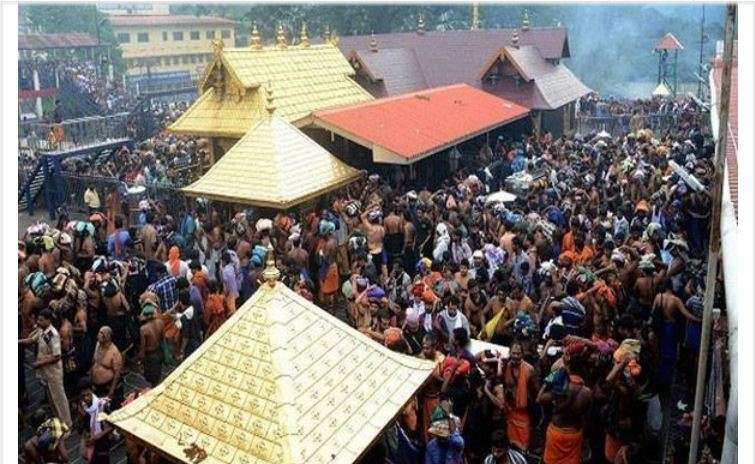The Supreme Court of India has sent the review petition pertaining to essential religious practices in the Sabarimala and other places to a 7-Judge Bench. The Sabarimala review petition will be looked only after the 7-Judge bench decides on the Essential Religious Practices Test and the correctness of the verdict in the Shirur Mutt case.
The Judgement was pronounced by a CJI ranjan Gogoi-led bench which also included Juctices A.M. Khanwilkar, Rohinton Nariman, Indu Malhotra and DY Chandrachud. Delivering the judgement, Chief Justice of India Gogoi said, "The entry of women into places of worship is not limited to this temple only. It is also involved in the entry of women into mosques."
A five-judge constitution bench of Supreme Court by 3-2 majority referred to 7-judge bench to consider the Supreme Court's earlier decision of quashing the custom barring entry of women of 10-50 age group into Sabarimala Ayyappa temple. The Supreme Court majority verdict did not say anything adverse against the apex court's September 28, 2018 decision allowing women to enter the shrine nor did it stay the earlier judgement.
The minority verdict by Justices R F Nariman and D Y Chandrachud gave a dissenting view by dismissing all the review pleas and directing compliance of its September 28 decision.
"Endeavour of petitioners was to revive debate on religion and faith," CJI Ranjan Gogoi said.
Reading out the judgement, CJI Gogoi said that the restrictions on women in religious places is not restricted to Sabarimala alone, prevalent in other religions also. .
"The Supreme Court should evolve common policy on religious places like Sabarimala", CJI said while referring to restrictions on entry of women into mosques.
Justices R F Nariman and Justice DY Chandrachud, who was also a part of the five-judge Supreme Court bench that had struck down the Rule 3(b) of the Kerala Hindu Places of Public Worship (Authorisation of Entry) Rules, 1965, which was the basis for barring entry of women between the ages of 10 and 50 years into the Sabarimala Temple, today dissented when the matter was sent to a larger Supreme Court Bench for review. Justice Indu Malhotra, who dissented in the 4:1 judgment that allowed entry of women (10-50 yrs) in the Sabarimala Temple was with the judgment of sending the matter to the larger 7-judge bench.
A five-member Constitution bench headed by Chief Justice Ranjan Gogoi had reserved its decision on February 6 after hearing various parties including those seeking reconsideration of the judgement in an open court. Total of 56 writ petitions was filed in the Supreme Court challenging its earlier order allowing entry of women into the temple. Clearly the matter is far from over as CJI Ranjan Gogoi-led bench in its 3:2 verdict made it clear that the matter was not limited to temple but would also have an effect on women seeking the right to pray in a mosque or other religious places.
Timeline of the Sabarimala Temple Case:
1990- A petition was filed in the Kerala High Court seeking a ban on entry of women inside the Sabarimala temple.
1991- The Kerala High Court had upheld the restriction of women of certain age entry inside the holy shrine of Lord Ayyappa.
2006- A petition was filed in the Supreme Court by the Indian Young Lawyers Association seeking entry of women between 10 to 50 years.
2008- The matter was referred to a three-judge bench two years later.
2016, January - The court had questioned the ban, saying this cannot be done under the Constitution.
2016, April - The United Democratic Front government of Kerala led by Chief Minister Oomen Chandy informed the SC that it is bound to protect the right to practice the religion of Sabarimala devotees.
2016, November - The Kerala Government had told the Supreme Court that it was in favour of allowing women inside the sanctum sanctorum of the temple.
2017- The Supreme Court referred the case to the Constitution bench.
2018, September - A five-judge bench of Supreme Court allowed the entry of women of all ages in the revered shrine. The state government sought time to implement the verdict, however even after the entry was allowed a large number of followers camped outside the shrine prevent the entry of women of all ages.
2019, February - The order was reserved by the Apex court.
(With ANI inputs)

